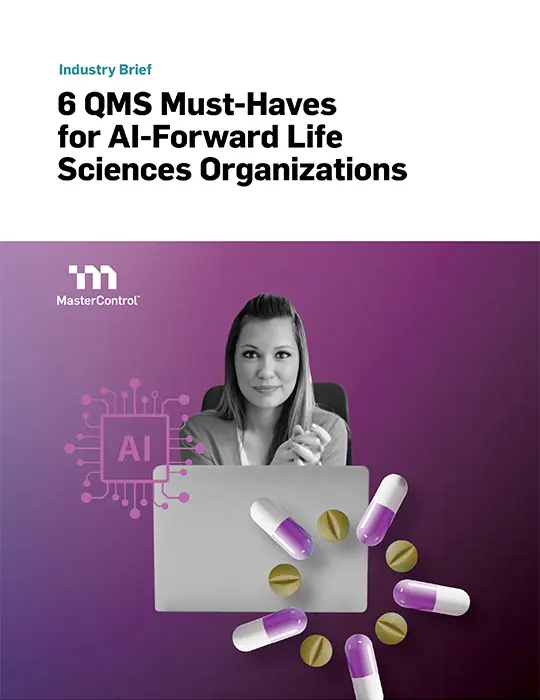
GxP Lifeline
Breaking Down Silos: How Integrated QMS Systems Transform Regulatory Compliance

Quality should be built into your product, not tested in afterward. This philosophy from the U.S. Food and Drug Administration (FDA) isn't just regulatory guidance—it's the foundation of true quality excellence. Yet many life sciences organizations continue to struggle with disconnected quality systems that create wasteful silos, increase compliance risks, and ultimately slow down the delivery of life-changing products.
The True Cost of Fragmented Quality Systems
How much does quality cost? More importantly, how much does poor quality earn?
While the exact dollar value of quality might be hard to calculate, the cost of fragmented quality processes is painfully clear: millions in rework, wasted resources, potential recalls, and lost market opportunities.
What happens when document control doesn't talk to training management? When corrective action/preventive action (CAPA) management lives in its own world separate from change control? When quality data exists but insights don't? Your entire quality ecosystem suffers.
The numbers tell the story. According to MasterControl's "6 QMS Must-Haves for AI-Forward Life Sciences Organizations" white paper, companies achieved a staggering 90% reduction in investigation cycle times for deviations and nonconformances after implementing advanced analytics in their quality management systems (QMS). That's not just incremental improvement—that's transformation.
Quality systems, integrated. Compliance risks, eliminated. That changes everything. Download the full white paper: "6 QMS Must-Haves for AI-Forward Life Sciences Organizations" to discover how leading life sciences companies are revolutionizing their quality processes.
The Regulatory Imperative for Connected Quality
The FDA isn't subtle about this: "Quality should be built into the product, and testing alone cannot be relied on to ensure product quality."1 This isn't just philosophical—it has profound implications for how life sciences organizations structure their quality management systems.
Regulators don't want to see quality as a separate department checking boxes. They want quality baked into every operation, every process, every decision. Meeting these expectations requires more than just digitizing paperwork—it demands a completely new approach to quality management.
Traditional systems—whether paper-based or digital but disconnected—create unnecessary barriers. They keep quality in silos when it should be flowing throughout your organization.
6 Essential Elements of a Modern Life Sciences QMS
To break down quality silos while maintaining strict regulatory compliance, your organization needs QMS capabilities designed specifically for today's complex regulatory environment:
1. Automation That Works For You, Not Against You
Modern enterprise QMS software should do more than just digitize paper. It should transform how work gets done.
Imagine standard operating procedures (SOPs) that route themselves for review. Training records that update automatically. Investigations that follow predefined workflows without manual intervention. With the integration of artificial intelligence (AI), these systems learn from historical data to suggest optimal paths, identify potential bottlenecks, and even recommend corrective actions based on similar past events.
This isn't just efficiency—it's liberation. Your quality teams can focus on solving real problems instead of pushing paper (even digital paper).
2. Connected Quality That Closes the Loop
Quality events never exist in isolation. A deviation triggers an investigation. An investigation leads to changes. Changes require updated documents. Updated documents demand new training.
When these processes live in separate systems, critical connections get lost. But when they're integrated, magic happens.
As one MasterControl customer put it: "We're all [on] one site, and so everybody around the world is together. Now I can see the documents that Poland is working on and vice versa. We haven't had that flexibility until now."2
Connected quality doesn't just improve efficiency—it actually transforms how problems get solved by enabling truly closed-loop quality management.
Higher quality. Lower cost. That changes everything. Download the white paper "6 QMS Must-Haves for AI-Forward Life Sciences Organizations" for insights that will transform your approach to compliance.
3. Analytics That Reveal What Matters
In today's data-rich environments, the difference between good and great quality management is intelligence.
An AI-powered QMS doesn't just collect data—it transforms that data into insights that drive action. It identifies patterns in deviations and other quality events, predicts potential issues before they occur, and helps you understand the true impact of quality decisions.
The most forward-thinking companies are using these capabilities to shift from reactive problem-solving to proactive quality assurance. They're addressing issues before they impact products or require formal CAPA processes—saving time, reducing costs, and protecting patients.
4. Flexibility That Grows With You
Your organization isn't static, so your QMS shouldn't be either.
As you add users, expand business units, launch new products, and adopt new technologies, your quality systems need to adapt without requiring complete overhauls.
The ideal enterprise QMS lets you start where you are and expand as needed. It adapts to your processes instead of forcing you to change how you work. It evolves with you through acquisitions, new markets, and changing regulations without missing a beat.
5. Always Audit-Ready, Never Audit-Afraid
Remember the last time an auditor showed up unexpectedly? The frantic search for documentation? The hope that training records were up to date?
Modern QMS software eliminates that panic by keeping your organization perpetually ready for audits. Complete audit trails. Electronic signatures. Easily accessible documentation. Training records that update automatically.
The impact of audit readiness is substantial. The white paper reveals that UCSF Health experienced a 50% improvement in training cycles after implementing a connected quality solution. And that's not just about efficiency—it's about eliminating one of the most common reasons for receiving an FDA Form 483.
6. Validation That Doesn't Hold You Back
For companies that manufacture regulated products, software validation has traditionally been a major barrier to technological progress. Every upgrade, every change required months of work and mountains of documentation.
But innovation has changed the game. Risk-based validation approaches now dramatically reduce the time and effort required to maintain validated systems.
MasterControl's patented Validation Excellence Tool, for example, allows users to complete validation in hours instead of months. This means you can stay current with software updates without compromising compliance or diverting resources from more valuable activities.
The AI Revolution in Quality Management
AI isn't coming to quality management. It's already here, and it's changing everything.
Today's AI-enabled QMS solutions offer capabilities that were science fiction just a few years ago:
- Predictive analytics that spot potential issues before they become problems.
- Intelligent automation that adapts workflows based on risk and complexity.
- Natural language processing (NLP) that extracts insights from unstructured quality data.
- Pattern recognition that connects seemingly unrelated events to identify systemic issues.
These capabilities don't replace your quality team—they supercharge them. They handle routine tasks and complex analyses so your experts can focus on what humans do best: solving complex problems and making critical decisions.
Your quality systems. Our AI technology. That changes everything. Download the white paper "6 QMS Must-Haves for AI-Forward Life Sciences Organizations" to ensure your quality systems are prepared for the future.
Building Your Case for QMS Transformation
Convincing stakeholders to invest in a new enterprise QMS often requires more than promises of better compliance. You need tangible benefits that impact the bottom line.
The white paper provides compelling metrics that help build this business case:
- 90% reduction in investigation cycle times.
- 50% improvement in training cycles.
- Validation time reduced from months to hours.
These are business transformers, not just impressive numbers. They mean faster time to market, reduced quality costs, improved productivity, and enhanced regulatory compliance. They translate directly to competitive advantage in an increasingly challenging marketplace.
Moving Beyond Siloed Quality
The life sciences industry stands at a crossroads. You can continue with fragmented quality systems that meet minimum compliance requirements but create inefficiencies and risks. Or you can embrace integrated, AI-powered quality management that turns compliance from a hassle to a strategic advantage.
As regulatory expectations evolve and competitive pressures increase, the choice becomes clear. Forward-thinking companies are investing in AI-ready enterprise QMS platforms that connect processes, leverage advanced technologies, and position quality as a strategic business function rather than a necessary cost.
By breaking down quality silos, these organizations aren't just improving compliance—they're transforming how life-changing products reach the people who need them.
Download the complete white paper "6 QMS Must-Haves for AI-Forward Life Sciences Organizations" to learn how MasterControl's QMS solutions are helping life sciences organizations break down quality silos and achieve operational excellence.
References:
- “Guidance for Industry - Quality Systems Approach to Pharmaceutical CGMP Regulations,” FDA, Sept. 2006.
- Fagron case study, MasterControl.
Free Resource

Enjoying this blog? Learn More.
6 QMS Must-Haves for AI-Forward Life Sciences Organizations
Download Now